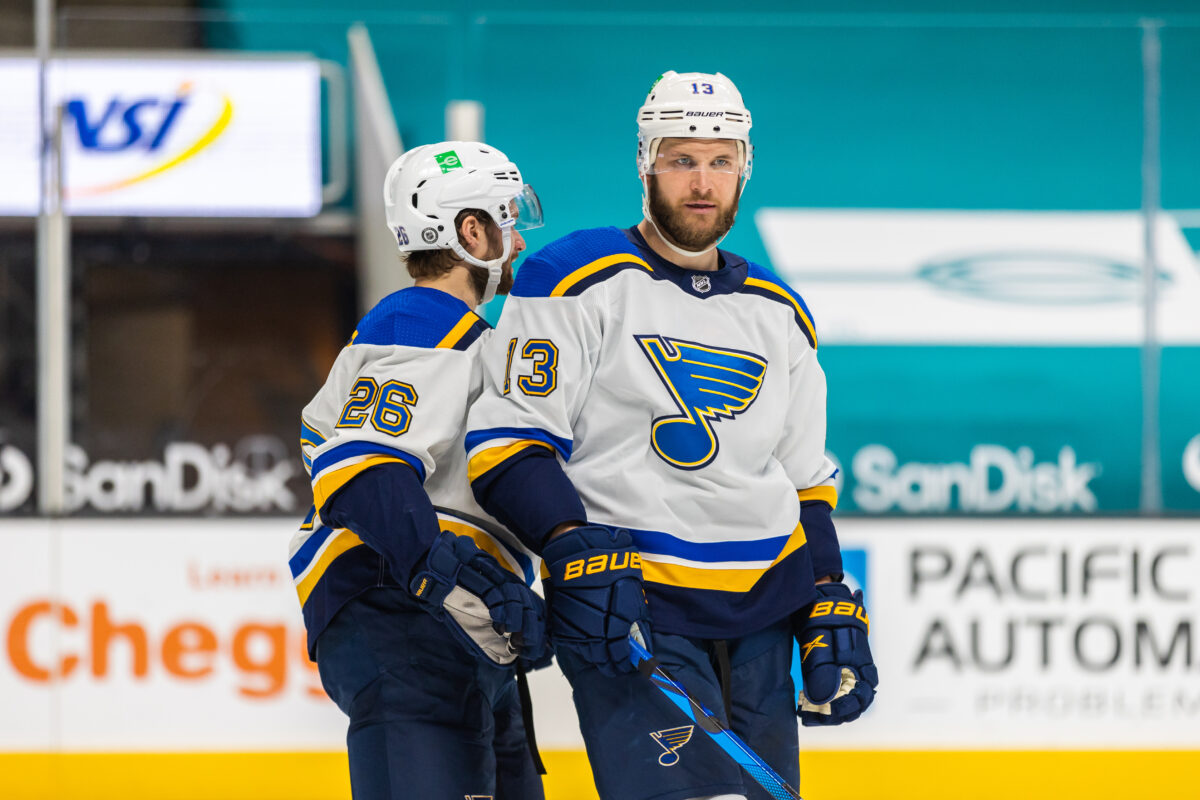The St. Louis Blues’ 2020-21 season had its highs and lows, but ultimately ended in disappointment after the team fell in four games to the Colorado Avalanche in Round 1. In this series, we’ll look back on the season, player by player, and evaluate each player’s performance as an individual, with an eye towards their future with the team.
When looking at the performance of resident “tough guy” Kyle Clifford, it can be tough to find the bright spots in his performance this season. Clifford signed with the Blues this offseason after spending last season with the Los Angeles Kings and Toronto Maple Leafs. Coming into this season, Clifford’s addition to the Blues lineup came with hopes of complementing the hard-hitting, defensive-minded system of head coach Craig Berube.
While Clifford’s time with the Blues thus far may not have been a complete success, he wasn’t without his share of positive results during the season. Let’s dive into Clifford’s output this year and analyze his performance from top to bottom.
What Went Right: Not One to Be Messed With
Since making his NHL debut in the 2010-11 season, Clifford made it abundantly clear he wasn’t going to be a pushover. A force in the league, Clifford continued his mean streak into his newly formed tenure with the Blues.
Clifford made an impact defensively as a winger, able to lay huge hits anywhere on the ice, and used his stick skills well to jostle for position and strip the puck off of the opposition. Clifford may not be in the running for the Rocket Richard Trophy, but he leaves no doubt that top forwards entering his zone feel his presence. By making their lives as difficult as possible over the course of a game, Clifford controls the pace of his match-ups and can drain his opponents physically.
Since his debut with the Blues, Clifford has continued his take no prisoners style of play. By using his physical style, Clifford was able to generate a spark of energy into the Blues lineup whenever he entered the game. Clifford was a serviceable member of the fourth line and was a constant jolt of energy for his team.
What Went Wrong: Signs of Regression
Now the ugly part. While his physicality was still the focal point of his game, this was without a doubt Clifford’s worst season of his career. At 30 years old it was clear to see that Clifford was not producing at an effective level.
In 50 games played this season, Clifford was able to squeak out seven total points. Not only was his offensive output lower than in years past, but his efforts defensively were also lessened. Clifford was brought on to the Blues to be a physical force on the ice, but rarely succeeded in this role. With virtually no time spent in the sin bin, Clifford did not live up to expectations set for him as an enforcer-type player.
With incredibly poor play on both sides of the puck, Clifford struggled to bolster confidence in his team, and had his ice time slashed as the season progressed. While Clifford was never intended to become a game-changing signing for the Blues, this season certainly was one to forget for the winger.

Key Stats
- 7 points (career low)
- 30 PIM (career low)
- 69 hits (T-5th on Blues)
Final Grade: D
The life of a grinder is a fickle one. Playing at a fast pace, embracing contact, and making plays that don’t show up on the statsheet is an unforgiving role. But, in the case of Clifford, his efforts in this role were mediocre at best.
Latest Blues Content:
- Hockey History – the NHL “Second Six”
- Oil Kings’ Adam Jecho Fits Well With St. Louis Blues’ Future Plans
- Parayko Snubbed From Team Canada Four Nations Projections
- Blues’ Forward Group in 2024-25 Will Be Far More Balanced
- Blues Add Potential Trade Deadline Chips in Faksa & Suter
While joining a new team can cause a slow start for a player, Clifford never seemed to catch up, looking a step behind for the entirety of the season. Clifford failed to deliver in nearly all areas on the ice and as a result, has landed himself a D for his final grade for the 2020-21 season.
What’s Next for Clifford?
Clifford is still signed on for one more season with the Blues on a team-friendly deal. Because of this, it’s likely we will see him stick around, but for the remainder of his contract, the Blues are going to need to see more from him if he plans to stay on the starting roster.
While his veteran status adds a sense of reliability to his game, after this season, Clifford has to prove himself. Moving forward, the Blues will need Clifford to ramp up his aggressiveness and get back to his bread and butter – laying people out. If Clifford can return to being a dominant factor defensively when his number is called, this could be a small step towards the Blues moving back into the win column.